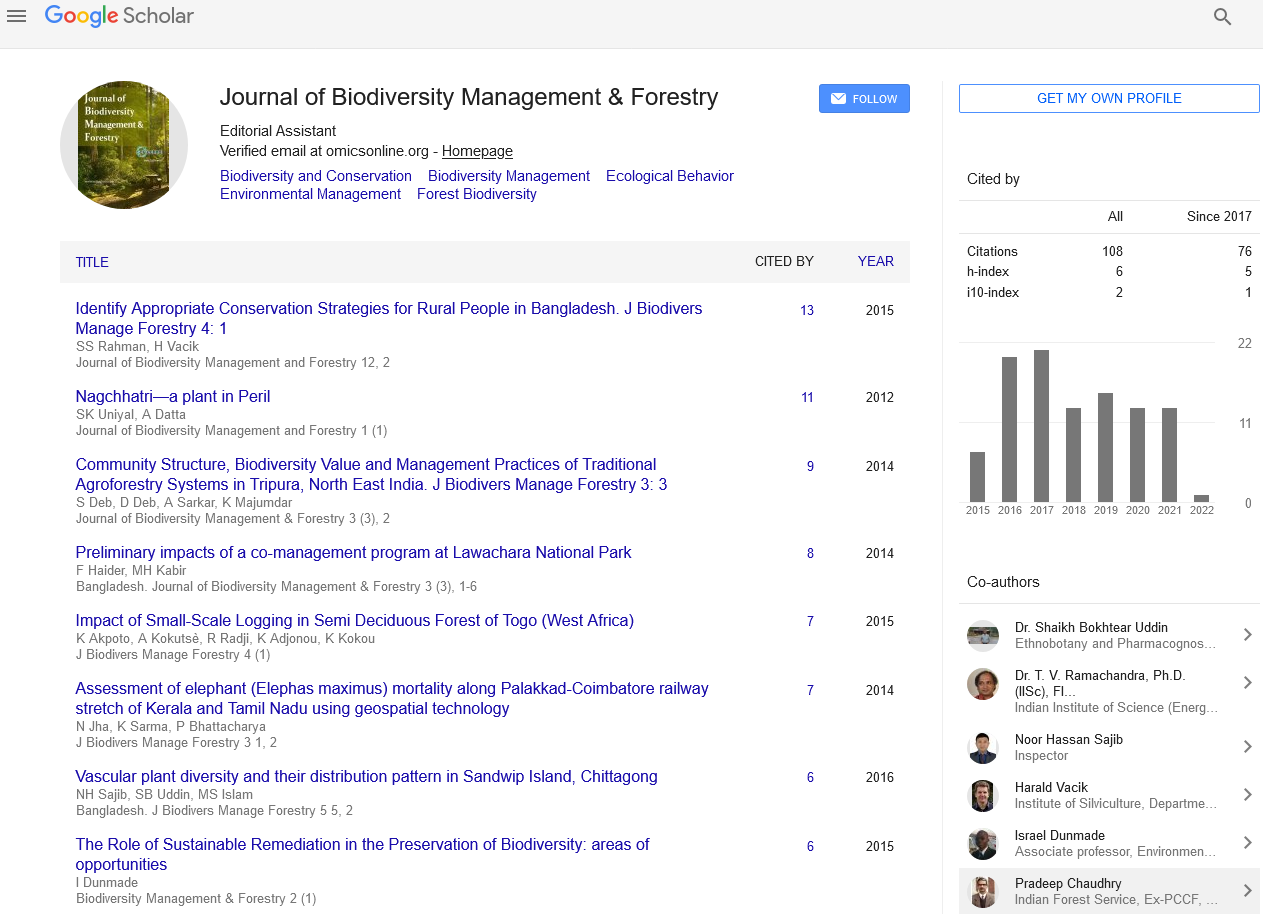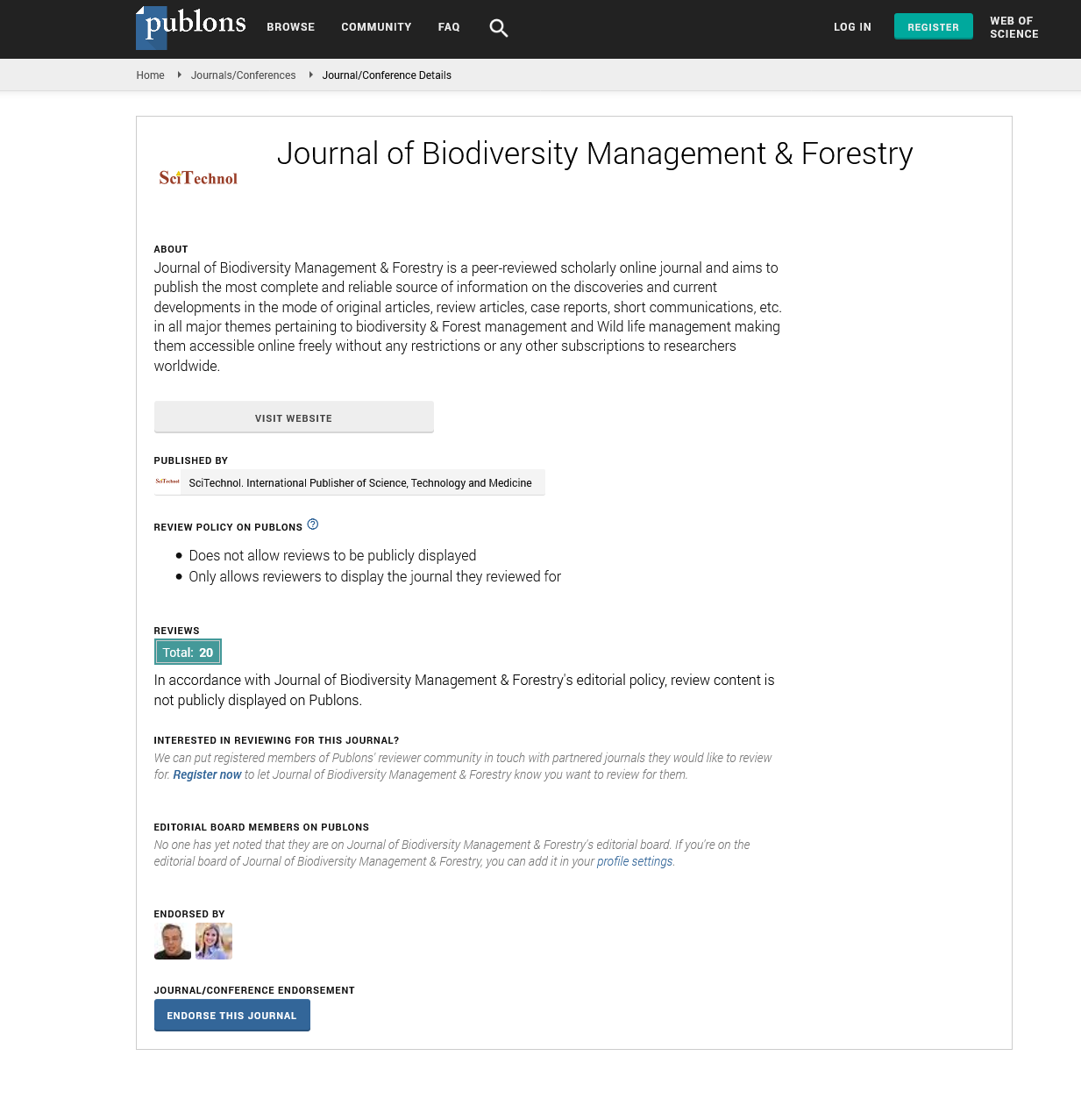Opinion Article, J Biodivers Manage Forestry Vol: 12 Issue: 2
Ecosystem Services and Biodiversity Conservation
Kelly Sarah*
1Department of Biodiversity, George Mason University, Fairfax, Virginia, USA
*Corresponding Author: Kelly Sarah
Department of Biodiversity, George Mason
University, Fairfax, Virginia, USA
E-mail: sar.kelly@sm.edu
Received date: 27 March, 2023, Manuscript No. JBMF-23-98633;
Editor assigned date: 30 March, 2023, Pre QC No. JBMF-23-98633(PQ);
Reviewed date: 14 April, 2023, QC No. JBMF-23-98633;
Revised date: 22 April, 2023, Manuscript No. JBMF-23-98633(R);
Published date: 28 April, 2023, DOI: 10.4172/jbmf 2327-4417.10032
Citation: Sarah K (2023) Ecosystem Services and Biodiversity Conservation. J Biodivers Manage Forestry 12:2.
Description
Ecosystem services and biodiversity conservation are two interconnected concepts that play an important role in maintaining the health and well-being of the planet and its inhabitants. Ecosystem services refer to the benefits that humans derive from functioning ecosystems, while biodiversity conservation focuses on the protection and sustainable management of the variety of life on Earth. Together, they contribute to the sustainability of the planet and are essential for the survival and future generations.
Ecosystem services encompass a wide range of ecological processes that provide direct and indirect benefits to human societies. These services can be categorized into four main types, provisioning, regulating, cultural, and supporting services. Provisioning services include the production of food, water, timber, and other resources necessary for human livelihoods. Regulating services involve the regulation of climate, water, disease, and pests, which are important for maintaining environmental balance and human health. Cultural services encompass the spiritual, recreational, and aesthetic values that ecosystems offer, such as tourism, cultural heritage, and inspiration for art and literature. Finally, supporting services refer to the fundamental processes that underpin all other ecosystem services, including nutrient cycling, soil formation, and pollination.
Biodiversity conservation, on the other hand, focuses on the protection, preservation, and sustainable management of the Earth's biological diversity. Biodiversity refers to the variety of life at all levels, from genes to ecosystems, and includes the diversity of species, habitats, and ecological processes. Biodiversity is essential for the stability and resilience of ecosystems and provides numerous benefits to human societies. It supports the provision of ecosystem services, contributes to the development of medicines and biotechnological innovations, and enhances the overall health and well-being of human populations.
Conserving biodiversity involves various strategies and approaches aimed at preserving ecosystems, species, and genetic diversity. Protected areas, such as national parks, nature reserves, and wildlife sanctuaries, are essential tools for biodiversity conservation. They provide safe havens for threatened species, conserve important habitats, and promote the recovery of ecosystems. Additionally, biodiversity conservation efforts focus on sustainable land and water management practices, restoration of degraded habitats, and the implementation of measures to combat habitat loss, pollution, and climate change.
The importance of ecosystem services and biodiversity conservation cannot be overstated. These concepts are deeply interconnected, as the conservation of biodiversity directly contributes to the provision of ecosystem services. For example, the presence of diverse plant species in a forest ecosystem ensures pollination, nutrient cycling, and soil formation, which are essential for the production of food, timber, and clean water. Similarly, the conservation of marine biodiversity helps maintain healthy ocean ecosystems that provide fisheries, regulate climate, and support coastal protection.
Furthermore, ecosystem services and biodiversity conservation have significant socio-economic implications. Ecosystem services contribute to human well-being, poverty alleviation, and economic development. They provide livelihood opportunities for local communities, support agriculture and food security, and generate revenue through tourism and recreational activities. Biodiversity conservation, on the other hand, safeguards the genetic diversity necessary for crop improvement, pharmaceutical discoveries, and the development of sustainable bio-based industries. It also plays a vital role in maintaining the resilience of ecosystems in the face of environmental challenges, such as climate change and natural disasters.
However, despite the recognition of the importance of ecosystem services and biodiversity conservation, these valuable resources are under threat. Human activities, such as deforestation, habitat destruction, pollution, overexploitation of natural resources, and climate change, pose significant challenges to the integrity of ecosystems and the survival of species. The loss of biodiversity and the degradation of ecosystems not only result in the loss of valuable services but also have far-reaching consequences for human societies, including the loss of cultural heritage, increased vulnerability to natural disasters, and negative impacts on human health.
 Spanish
Spanish  Chinese
Chinese  Russian
Russian  German
German  French
French  Japanese
Japanese  Portuguese
Portuguese  Hindi
Hindi 
